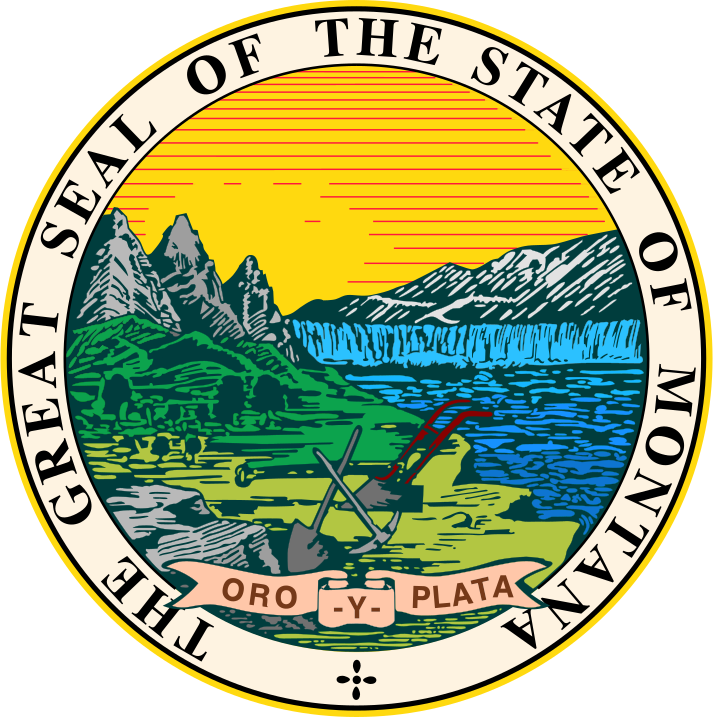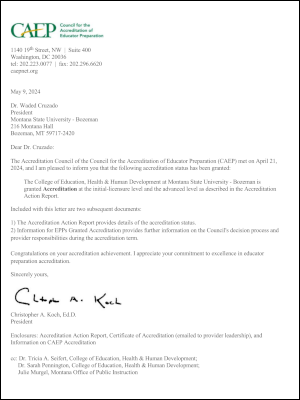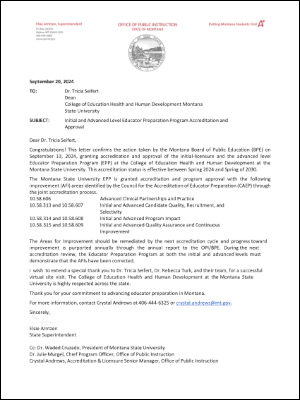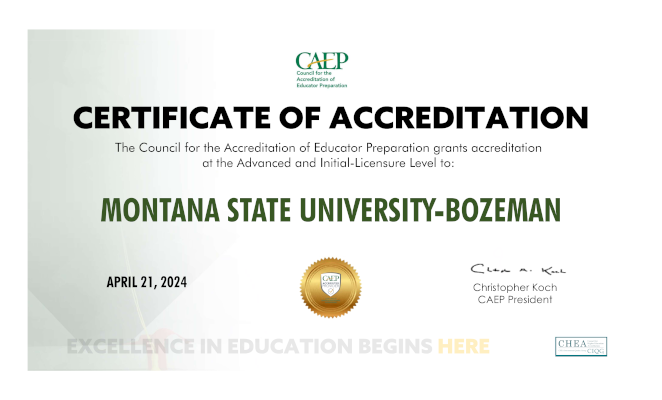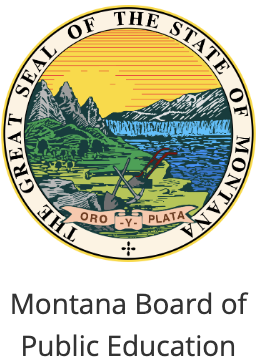Accreditation
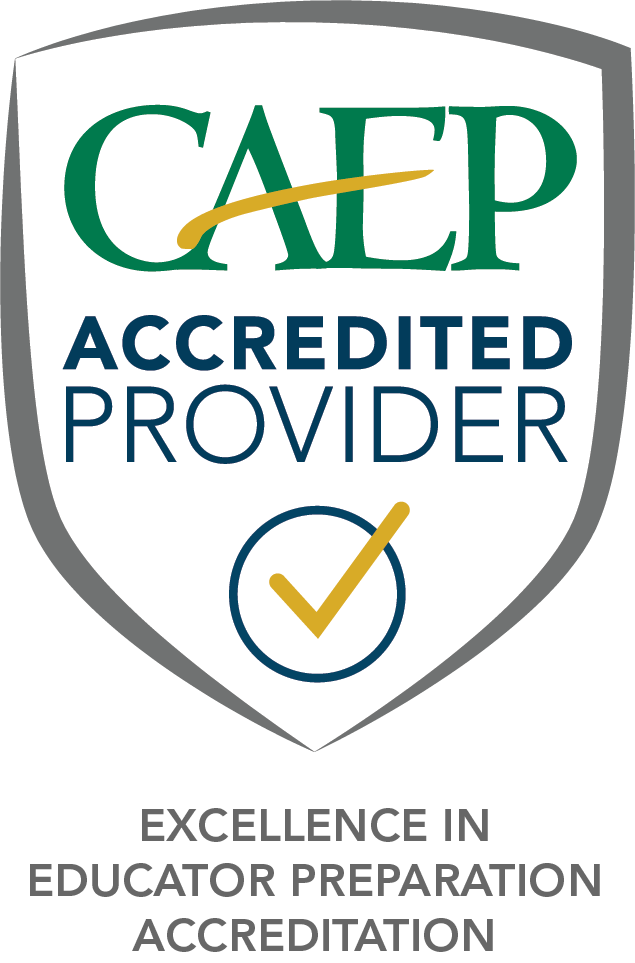 |
The initial licensure and advanced level educator preparation programs at Montana State University—Bozeman have been granted national accreditation by the Council for the Accreditation of Educator Preparation. CAEP promotes excellence in educator preparation through content and pedagogy, clinical partnerships and practice, candidate recruitment, progression and support, program impact, and quality assurance and continuous improvement. These programs have been granted state accreditation by the Montana Board of Public Education. |
Montana Board of |
- Agricultural Education: Broadfield Teaching
- Art: Art Education K-12 Broadfield
- Biological Sciences: Teaching
- Chemistry: Teaching
- Early Childhood Education: P-3
- Elementary Education: K-8
- English: Teaching
- Family and Consumer Sciences: Teaching
- Health Enhancement: K-12
- History: Teaching
- Mathematics: Teaching
- Modern Languages & Literatures
- French Teaching
- German Teaching
- Spanish Teaching
- Music Education: School Music K-12 Broadfield
- Physics: Teaching
- Secondary Education: General Science Broadfield
- Secondary Education: Social Studies Broadfield
- Technology Education: Broadfield Teaching
- Master of Arts in Teaching Elementary
- Master of Arts in Teaching Secondary
- Principal Preparation: Master of Education, Educational Leadership
- Superintendent Preparation: Superintendent Certificate, Educational Leadership
In 2011, the Council of Chief State School Officers (CCSSO) a nonpartisan, nationwide, nonprofit organization of public officials who head departments of elementary and secondary education, drafted the InTASC Model Core Teaching Standards. Our department's Conceptual Framework, as well as the standards of the Council for the Accreditation of Educator Preparation, are aligned with the InTASC Standards.
A breif summary of the standards follows. Those seeking more complete information may download the InTASC Model Core Teaching Standards and Learning Progressions for Teachers 1.0 directly from the CCSSO.
Standard #1: Learner Development - The teacher understands how learners grow and develop, recognizing that patterns of learning and development vary individually within and across the cognitive, linguistic, social, emotional, and physical areas, and designs and implements developmentally appropriate and challenging learning experiences.
Standard #2: Learning Differences - The teacher uses understanding of individual differences and diverse cultures and communities to ensure inclusive learning environments that enable each learner to meet high standards.
Standard #3: Learning Environments - The teacher works with others to create environments that support individual and collaborative learning, and that encourage positive social interaction, active engagement in learning, and self motivation.
Standard #4: Content Knowledge - The teacher understands the central concepts, tools of inquiry, and structures of the discipline(s) he or she teaches and creates learning experiences that make these aspects of the discipline accessible and meaningful for learners to assure mastery of the content.
Standard #5: Application of Content - The teacher understands how to connect concepts and use differing perspectives to engage learners in critical thinking, creativity, and collaborative problem solving related to authentic local and global issues.
Standard #6: Assessment - The teacher understands and uses multiple methods of assessment to engage learners in their own growth, to monitor learner progress, and to guide the teacher’s and learner’s decision making.
Standard #7: Planning for Instruction - The teacher plans instruction that supports every student in meeting rigorous learning goals by drawing upon knowledge of content areas, curriculum, cross-disciplinary skills, and pedagogy, as well as knowledge of learners and the community context.
Standard #8: Instructional Strategies - The teacher understands and uses a variety of instructional strategies to encourage learners to develop deep understanding of content areas and their connections, and to build skills to apply knowledge in meaningful ways.
Standard #9: Professional Learning and Ethical Practice - The teacher engages in ongoing professional learning and uses evidence to continually evaluate his/her practice, particularly the effects of his/her choices and actions on others (learners, families, other professionals, and the community), and adapts practice to meet the needs of each learner.
Standard #10: Leadership and Collaboration - The teacher seeks appropriate leadership roles and opportunities to take responsibility for student learning, to collaborate with learners, families, colleagues, other school professionals, and community members to ensure learner growth, and to advance the profession.
This information was summarized from material copyright © 2011 by the Council of Chief State School Officers, Washington DC and reproduced here under Creative Commons License.
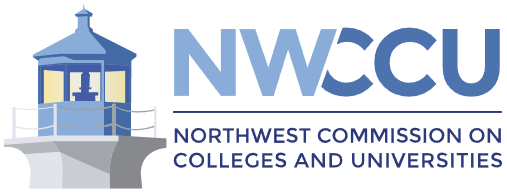 This page deals primarily with accreditation of our educator preparation program.
Information about the overall accreditation of Montana State University by the Northwest Commission on Colleges and Universities can be found on the Provost's MSU Institutional Accreditation page.
This page deals primarily with accreditation of our educator preparation program.
Information about the overall accreditation of Montana State University by the Northwest Commission on Colleges and Universities can be found on the Provost's MSU Institutional Accreditation page.

